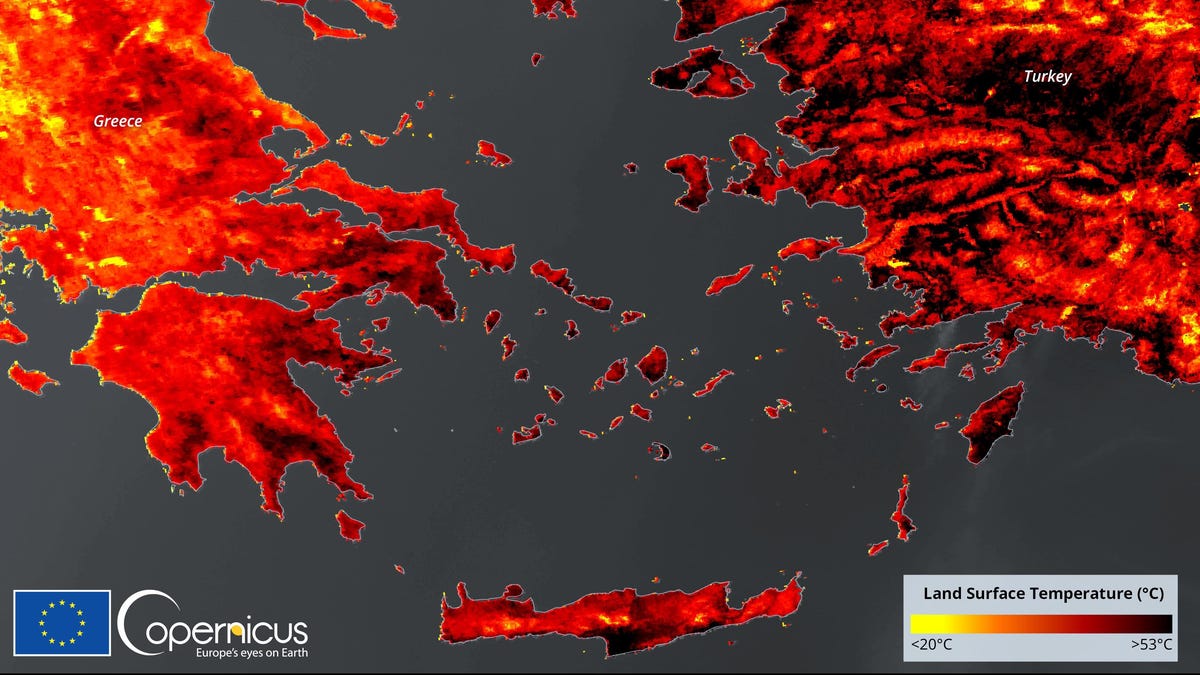
In the midst of scorching heat in Turkey, Greece and Turkey, wildfires are raging out-of-control. New data has shown that temperatures reached 53 degrees Celsius (127 degrees Fahrenheit) in some parts of Turkey and Greece on Tuesday.AdvertisementCopernicus' Sentinel 3 satellite recorded the temperatures, which is part of the European Unions Earth Observation Program. Copernicus published a heat map showing the severity of the situation, color-coded. The map has a lot of black and red, which indicates that there are widespread ground temperatures that could burn your feet.High temperatures in Turkey and Greece add to the worrying trend of high ground temperatures in areas experiencing extreme heat this summer. The ground temperature in Washington State reached a shocking 145°F (63°C) during the Pacific Northwest heatwave. The Arctic Circle had a record-breaking 118 degree Fahrenheit (48° Celsius) in June. This is an alarming figure because the Arctic Circle's permafrost contains so much methane that extreme heat could cause frozen soil to thaw.Hot ground can pose a health risk to the public. People who come into contact with hot pavement can sustain serious burns or injuries. Hot surface temperatures can cause cracks in roads and other infrastructure.It is important to remember that the temperature of ground surfaces does not equal air temperatures. These are our standard barometer to gauge how hot a location is. Because heat is more readily dissipated in air, surface temperatures are usually higher. However, the Mediterranean's air temperatures have not provided much relief.Turkey's July record-breaking temperature was 120.4 Fahrenheit (49.1 Celsius). Antalya, a tourist spot that has been ravaged by wildfires in recent days, has recorded temperatures over 104 Fahrenheit (40.6 Celsius) consistently in recent days. On Tuesday, Greece saw its own national record of 115.3 degrees Fahrenheit (46.3 Celsius).According to Kyriakos Mitsotakis, the Greek Prime Minister, we are currently facing the worst heat wave in history. Mitsotakis said that the government did everything possible to ensure electricity was not lost.AdvertisementGround temperatures and too-hot air are alarming signs of the effects of the climate crisis. These two countries are currently experiencing a severe heat wave and severe drought. Turkey has been ravaged by wildfires for almost a week, causing the deaths of at least eight people and forcing thousands of people to flee. The government is calling for international assistance to combat the seven remaining fires. This year, Turkey has seen three times the number of fires than usual.It is likely that the region will remain extremely hot in the coming days. This will lead to higher ground temperatures and more alarmingly high temperatures. The current suffering in eastern Mediterranean is almost certain to be worsened by carbon pollution due to burning fossil fuels, just as it was with the Pacific Northwest heatwave, which was 150 times more likely because of climate change.AdvertisementClimate change makes every heat wave more likely and more intense, Friederike Otto, Associate Director of the Environmental Change Institute at University of Oxford and lead author of the Intergovernmental Panel on Climate Change report, explained to Politico.
